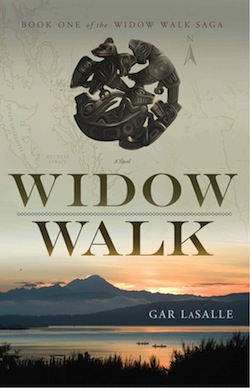
Peeking into the past can provide valuable insight about the present, even if the two time periods and places seem like very different worlds. In Widow Walk by Gar LaSalle, readers are transported into the lives of bold settlers in the Pacific Northwest, determined survivors in the wilderness, who must face seemingly endless trials in their bid to make that land a home.
The brilliant component of this novel is that it doesn’t come across as distant historical fiction for the sake of escapism or novelty – it is packed with timeless life experiences, existential crises, and subjects of sovereignty and race that remain a huge part of America’s national experience.
Emmy Evers forms a core part of the storytelling, and many of the events are seen through this unusual settler’s eyes. She and her husband have key roles in the community on Whidbey Island and their differing perspectives when it comes to protection, expansion and violence make them fascinating characters to watch develop, particularly in the case of Emmy. She is hardheaded, calculating and a woman who doesn’t allow her principles to bend, certainly not to corruption or intimidation. Readers also see her experience tremendous loss and tragic choices, making it difficult not to identify or empathize with her situation.
An unexpected element of this novel is the time taken to see this chunk of history through the natives’ eyes. Although many Americans are unaware of the full history of the Pacific Northwest, it is fraught with aboriginal clashes, many just as violent and controversial as those in the Midwest and Eastern regions of the country. Certain aspects of American history tend to be washed out or written over, so a novel like this one, which takes a naked and unbiased look at history, is quite refreshing, and important. Balancing historical fact with narrative fiction, LaSalle manages to create a seamless story with characters deep enough to dive in and swim around, giving readers a true feel for life in those perilous and uncertain times.
The pacing of the novel, despite it being quite long, is excellent, and there are few sections that drag or lend themselves to distraction. LaSalle demonstrates a real mastery of language in his descriptions of the land and environment, burying metaphors among beautiful turns of phrase and cleverly avoiding clichés of the genre. With different viewpoints being represented throughout the novel, it can be difficult for authors to maintain distinct and memorable characters, but the shifting narrator is brilliantly executed in this novel. By actually seeing both sides of certain stories, events and contentious issues, readers are able to sincerely consider their own beliefs, using this story as a philosophical starting point.
Despite being set so far in the past, the sense of crisis and the response of raw human determination seems timely, as does the strong-willed character of Emmy. LaSalle offers an unabashed glimpse into the challenges of existence for people of all kinds, but does so respectfully and impartially. The beauty of the language and the grand scope of the intermingling plot reveal an author with a knack for tapping into emotional reservoirs with his words, making Widow Walk a truly excellent work of historical fiction, and an exemplary start to a series.
Book Links
STAR RATING
Design
Content
Editing
Get an Editorial Review | Get Amazon Sales & Reviews | Get Edited | Get Beta Readers | Enter the SPR Book Awards | Other Marketing Services























Leave A Comment